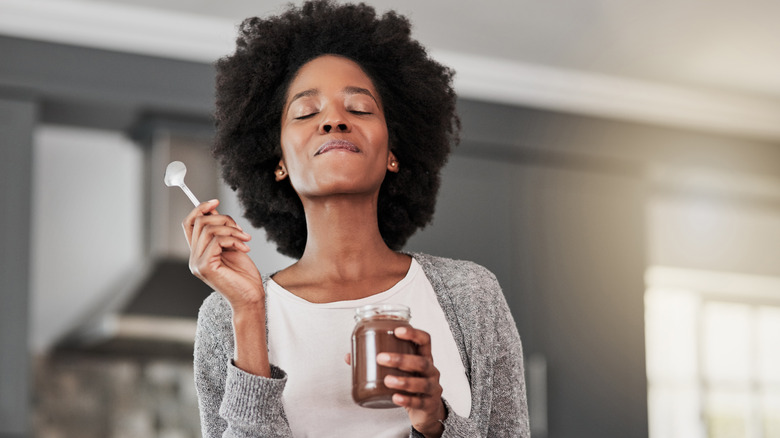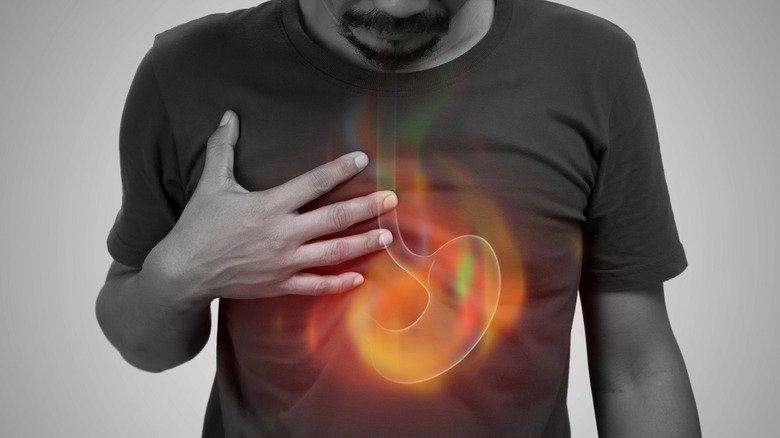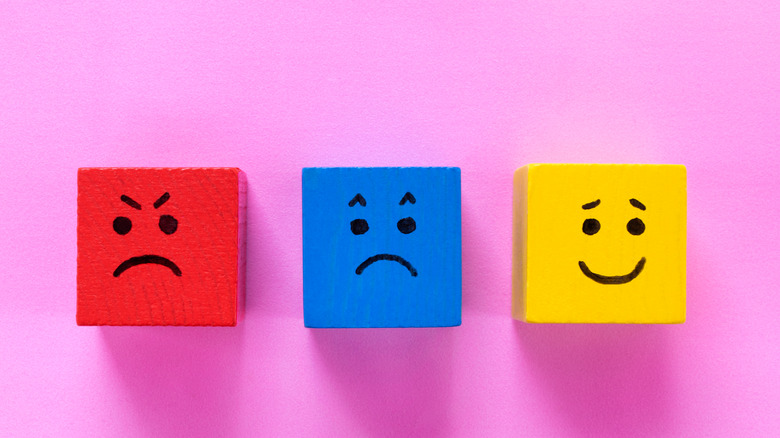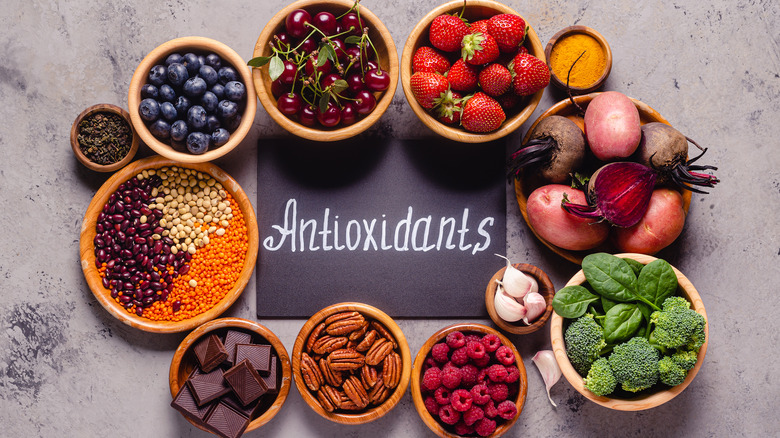When You Stop Eating Chocolate, This Is What Happens To Your Body
Whether you prefer sweet and velvety smooth milk chocolate, rich and creamy white chocolate, or the slightly bitter yet decadent dark variety, chocolate has been a popular food for over three thousand years. In fact, according to Statista's chocolate industry statistics and facts, approximately 4.7 million tons of cocoa are produced globally every year, and Americans love it so much that the cocoa and chocolate market is believed to be valued at around 9.67 billion dollars.
When it comes to chocolate, you'll find that its unique taste and texture have found their way into a wide range of uses in both culinary and confectionery applications. For instance, it serves as a primary ingredient in various desserts such as cakes, cookies, and brownies. Chocolate is also commonly used in the creation of truffles, bonbons, ice creams, and pralines, where it is combined with other ingredients to produce delectable sweets. In addition to its role in desserts, chocolate can be found in beverages like hot chocolate and chocolate milk, providing a comforting and indulgent experience. Plus, research even suggests that its intake may provide plenty of health benefits.
However, what about when you stop indulging in this well-liked food? Take a look at all the things that may happen to your body when you stop eating chocolate.
You might lose weight
It is no secret that eating chocolate can lead to weight gain, and according to a study published in the journal Plos One, this can be attributed to two different reasons.
One of the primary reasons is due to the high caloric and added sugar content typically found in chocolate products. For example, according to the U.S. Department of Agriculture (USDA), a 3.5-ounce serving (100 grams) of sweetened milk chocolate packs a whopping 535 calories and 52 grams of sugar, which is the equivalent of consuming 13 teaspoons of sugar. Similarly-sized servings of white and dark chocolates provide 539 and 598 calories and 59 and 24 grams of sugar, respectively.
On the other hand, the study explains that chocolate has a low satiety capacity, meaning that it has little ability to promote feelings of fullness after eating it. Thus, if a food with a high satiety capacity promotes the sensation that you've had enough to eat and that you no longer feel hungry, one that doesn't lead to feelings of fullness (such as chocolate) may lead to overeating and, consequently, promote weight gain. Therefore, when you stop eating chocolate, you might notice a reduction in your weight and your waistline.
You may experience fewer migraines and headaches
Those who experience migraines frequently know that they are so much more than just a horrible headache. According to the American Migraine Foundation (AMF), migraines are a disease of the brain that can lead to symptoms such as pounding or throbbing head pain, nausea and vomiting, and even sensitivity to light, noises, and smells. And while the exact reasons behind migraine attacks are still unknown, the AMF suggests that certain foods are among the most common migraine triggers, and chocolate is known to be one of them.
Per a 2020 review published in Nutrients, chocolate may either induce or worsen a migraine attack in up to 22% of people with migraine, which is why doctors often advise against its consumption. As explained by the review, certain components present in chocolate may trigger migraines in susceptible individuals. For example, chocolate may increase the levels of nitric oxide and serotonin in the brain, two important chemical messengers that have been associated with the onset of migraine-type headaches. It is important to note that the relationship between chocolate and migraines can vary from person to person. However, by stopping or reducing chocolate consumption, you may limit the risk of triggering migraines.
You may miss out on its heart-health-friendly benefits
Taking care of your heart is among the many purported health benefits chocolate has to offer, and evidence suggests this has to do with chocolate's high antioxidant content (specifically dark chocolate).
According to an article published in Reviews in Cardiovascular Medicine, a group of antioxidants known as flavonols are responsible for dark chocolate's heart-healthy effects. Moderate intake may help lower your blood pressure and blood cholesterol levels and reduce the risk of irregular heartbeats, heart attacks, heart failure, and stroke. This is due to flavonols' multiple mechanisms of action, which include helping relax blood vessels, reducing inflammation, preventing blood clotting, and protecting against the oxidation of fats. Therefore, by avoiding dark chocolate consumption, you may miss out on all of these heart-healthy benefits.
But there's no need to worry, seeing that eating dark chocolate is not the only way to look out for your heart health. In fact, there are plenty of other things you can do to lower your risk of heart disease, such as exercising, quitting smoking, and adding colorful fruits and veggies to your diet.
It may help improve heartburn symptoms
The UK's National Health Service (NHS) describes heartburn as a burning feeling in the middle of your chest (right where your esophagus meets your stomach). Heartburn happens because your stomach's acids travel upward to your esophagus, hurting it and causing the unpleasant sensation. And while there are multiple ways to stop or reduce heartburn, reducing chocolate intake has been suggested as a potential strategy to alleviate its symptoms, because while chocolate doesn't cause heartburn, a 2022 study published in Cureus states that it is known to be a trigger food.
Chocolate is considered a common heartburn culprit for many people due to its composition and potential effects on the digestive system. Healthline explains that compounds such as caffeine, theobromine, and cocoa in chocolate may be responsible. Cocoa can relax the lower esophageal sphincter (LES), a muscular ring that acts as a barrier between the stomach and the esophagus. When the LES relaxes, stomach acid can more easily flow back up into the esophagus, leading to heartburn symptoms.
Meanwhile, while theobromine may also worsen the symptoms, a study published in the journal PNAS explains that caffeine stimulates acid production in the stomach. Thus, caffeine's stimuli can also contribute to the development of heartburn symptoms. As you can see, while not everyone may experience heartburn symptoms after consuming chocolate, reducing chocolate intake can help minimize the risk of heartburn by limiting the intake of these potential triggers.
You may experience mood swings
Many people often turn to chocolate as a comfort food, seeking the potential mood-enhancing effects of the deliciously decadent treat. In fact, according to a study published in the journal Depression and Anxiety, chocolate's beneficial effects (namely dark chocolate) go as far as helping lower the risk of presenting depression symptoms. Similarly, a review published in Planta Medica states that chocolate intake may help with symptoms of anxiety, depression, and other affective disorders.
Per the review, there are several compounds that may contribute to the perceived positive impact. For instance, chocolate contains phenylethylamine (PEA), a compound often called a "love drug" due to its association with the release of endorphins (or "feel-good" hormones), which may help with the reduction of a negative mood. In addition, the combination of theobromine and caffeine in chocolate also seems to play a role. Hence, since enjoying chocolate in moderation can temporarily uplift your mood, you might experience mood swings when you stop eating it.
It may help clear your skin from acne
If you've ever heard that eating chocolate can lead to acne breakouts but always disregarded it as nothing more than a myth, you might want to give it a second thought.
According to a 2016 study published in the International Journal of Dermatology, the potential link between chocolate intake and acne has been a subject of interest and investigation for decades, and while the relationship between the two is complex, some evidence suggests that reducing chocolate consumption (especially dark chocolate) may help reduce acne symptoms in certain individuals. In fact, according to the study, consuming 25 grams of 99% dark chocolate daily for a month worsened acne by leading to higher acne lesions in acne-prone men.
Furthermore, other processed forms of chocolate contain a number of ingredients that may trigger or exacerbate acne breakouts in susceptible individuals, such as added sugars or dairy (via Byrdie). Nevertheless, while some individuals may experience a worsening of acne symptoms with chocolate consumption, others may not observe a significant effect. Still, you may notice that one of the perks of giving up chocolate is that your skin may begin to clear out.
You may have trouble concentrating
Per a 2020 study published in Nutrients, being a cocoa product, chocolate may be beneficial for brain health by inducing a positive effect on cognitive function (a.k.a the improvement of mental abilities like reasoning, thinking, learning, problem solving, decision making, memory, and attention). While research on the matter is still limited, antioxidant compounds in chocolate have been identified as potential contributors to cognitive function.
For instance, the study found that, due to its flavonol content, acute or short-term chocolate intake seems to improve blood flow to the brain. Thus, with more blood reaching the brain (which increases the delivery of oxygen and nutrients), healthy young adults showed an enhanced cognitive performance. Moreover, flavonols' effect on your brain's blood flow may also have a beneficial impact in the long run, seeing that a chronic chocolate intake was also associated with better cognitive performance, namely cognitive function and memory.
Therefore, since research seems to suggest that there is a positive link between chocolate intake and cognitive function, you may have trouble performing certain mental abilities, such as concentrating or remembering things, once you stop consuming it.
It may reduce the risk of cavities and tooth decay
Reducing your chocolate intake can help you reduce the risk of cavities and tooth decay because chocolate, particularly in the form of sweets, contains sugar, which plays a significant role in dental health. As explained by Healthline, when you consume sugary foods like chocolate, the bacteria present in your mouth feed on the sugar and produce acids as a byproduct. These acids can attack the tooth enamel, the outer protective layer of the teeth, leading to demineralization and the formation of cavities over time.
Therefore, by limiting or reducing chocolate intake (especially the sweetened varieties), you can help minimize the frequency and duration of sugar exposure to the teeth, thereby reducing the risk of cavities and other forms of tooth decay. Nevertheless, this association doesn't seem to apply when it comes to dark chocolate (which typically contains less sugar than milk or white chocolates). In fact, as Doctor of Dental Surgery (DDS) Mark Burhenne explains via Ask the Dentist, dark chocolate is generally considered a better choice for dental health, as its compounds may actually help protect your teeth by preventing cavities due to their anti-bacterial properties.
It may lead to a reduced antioxidant intake
According to a review published in the International Journal of Environmental Research and Public Health, cocoa (which is the primary ingredient in chocolate) is widely recognized as a top source of healthy antioxidants (namely polyphenols) in the human diet. While chocolate has always been a highly sought-after food, its popularity has grown over the years as research began to uncover its multiple potential beneficial health effects, such as regulation of blood pressure and blood sugar, blood vessel function, prebiotic effects, and fat metabolism, all of which seem to be linked to its high antioxidant content.
As a result, when you stop eating chocolate, you might be cutting out one significant source of these healthy compounds from your diet. Nevertheless, it is worth mentioning that this may only happen if you give up dark chocolate, as this is the variety with a higher percentage of cocoa solids. Generally, dark chocolate contains more antioxidants compared to milk or white chocolate, which undergo more processing and may have added ingredients that dilute the antioxidant content.










